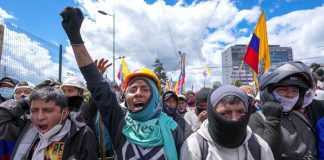South African workers have put their government on notice that they will not bear the burden of the global economic crisis.
In mid-August, 1.3 million public sector workers issued the ruling African National Congress with demands for an 8.6 per cent pay rise and a $144 monthly housing allowance. They responded to President Jacob Zuma’s offer of 5.2 per cent by voting for “a total shut down of [public] institutions” from August 18. The following 20-day strike cost the government $3 billion.
Under the wary eye of capital investors, Zuma had labeled the strikers “selfish” and sent in riot police and scab labour to break the strikes.As picketing teachers and hospital workers withstood rubber bullets and tear gas, workers in the private sector found renewed confidence and reasserted their own wage claims. Automotive workers and petrol station attendants struck from the beginning of September for a 15 per cent increase. Thousands of miners at the Northam Platinum mine, in Limpopo, remain on strike for pay increases amounting to 32 per cent. The mining giant is suffering loses of $1.3 million per day since the strike began on September 11.
The strike wave has created a stronger sense of unity among the working class. Demands for a two million-strong general strike in support of the public sector workers quickly reverberated around the county.
Zwelinzima Vavi, general secretary of the Cosatu trade union federation, told public sector strikers in late August, “We will not allow you to go back to work without victory in your hands.” The National Union of Mineworkers promised that, “every mining operation, every construction site and every energy worker [will] join…the strike.” The anger was such that even the army union agreed to join the public servants on the streets.
Union leaders eventually suspended the general strike, planned for September 2. Class tensions have, none-the-less, clearly sharpened. The Financial Times ruefully described 2010 as the “worst year of industrial action” since the fight to end apartheid in 1994. In the six months to June, around 1.25 million work days were lost to strikes, more than twice the number of the previous year. The public sector strike alone cost 10 million work days.
The huge leap in industrial action reflects the loss of credibility that Zuma’s ruling ANC has suffered among the country’s mostly poor workforce. The trade union backing that handed Zuma the presidency in 2009 had many workers expecting a reversal of the free market policies of his predecessor. Instead, Zuma cut public spending and implemented utility price increases to ward off the effects of the economic downturn. State electricity tariffs alone have increased by 35 per cent.
We won’t pay for their crisis
Investors are looking on disapprovingly as workers refuse to shoulder the cost of the crisis and fight for above-inflation (3.7 per cent) wage increases. London economist Peter Attard Montalto from Nomura corporation lamented that, “the government was setting a bad example” with its latest offer of 7.5 per cent to the public sector workers. The recent wage increases in South Africa, he added, “are not only divorced from inflation but more importantly from productivity.”
The idea that workers might get a fairer share of bosses’ profits instead of simply agreeing to work longer hours for any pay rise is apparently too much to ask. But public sector workers are more worried about the instability of the global economy, demanding a one-year agreement. During the global economic crisis inflation in South Africa hit a high of 13.4 per cent in 2008. Workers are unwilling to lock in future wage rates when they may end up delivering wage cuts if inflation rises again.
The anger workers expressed towards their union leaders when the September 2 general strike was called off shows there is still much more to be fought for. Most people struggle against grinding poverty. Half of South Africans live on just $46 a month.
A resolute South African working class is demonstrating the kind of resistance needed to turn back attacks on living standards across the world. As Europe braces for further anti-austerity protests, union leader, Mzwandile Makwayiba, issued a rallying cry:
“I would say to [other] workers, our fight is your fight. We are fighting a global battle against neoliberalism, against the bosses who want to force us to pay for their crisis. If we are prepared to fight hard, and we stand united, we can win.”
By Carl Taylor





